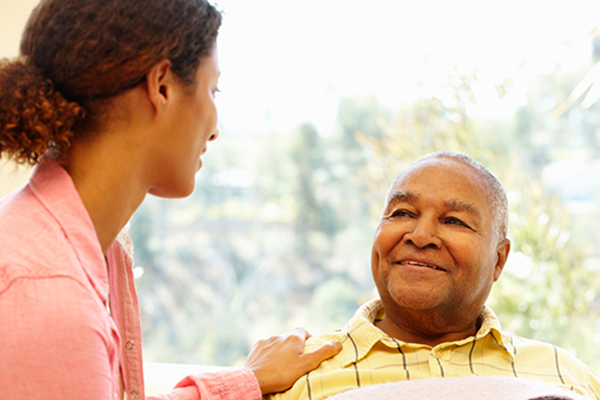Practical Advice for Acute Myeloid Leukemia Survivors During Treatment
Living through acute myeloid leukemia (AML) diagnosis and treatment can be difficult. Treatment often begins suddenly, even though you might have felt fine or thought you had a minor illness.
You may need to be in a hospital for long periods of time. Treatment may require you to stay away from crowds or public places because your immune system is weakened. You may feel isolated because you can’t go to work, school, the grocery store, or do activities you enjoy. People with AML often say they feel like the illness has taken over their life very suddenly with no time to prepare. Here are some coping strategies recommended by AML survivors and healthcare providers.
Preparing for In-Hospital Treatment
Talk through your choices with your family, friends, and healthcare team. They can help you think about the pros and cons of different treatments. Ask how likely it is for the treatment to work.
Also, consider travel arrangements if the nearest treatment center is far away, or if you decide to join a clinical trial. Anticipate long stays in the hospital, for weeks to months. A hospital social worker or financial counselor can aid you in researching and coordinating insurance, travel, and housing.
Often, people with AML will not be able to work during treatment. Talk to your hospital social worker and workplace Human Resources department right away about how to apply for short- and long-term disability benefits. It can take up to six months for long-term benefits to begin.
Finally, start thinking about how friends and family can help. You can expect to need six to nine months of help with things like household tasks, cooking, cleaning, errands, rides, childcare, and financial support.
While in the Hospital
Once you are in the hospital, your full-time job is getting healthier. You will need help from your treatment team, social workers, friends, family, and the community.
- Ask for resources. Ask to talk to a social worker or patient advocate. Ask what resources are available at the hospital and in your local community for support.
- Beef up your healthcare team. Expand your healthcare team to include useful specialists, such as a nutritionist, a psychologist or therapist, a physical therapist, a palliative care specialist, and a financial advisor to help you plan for costs. Ask who to talk to and how to contact them about any issues or side effects. If stem cell transplant is a next step, connect with a transplant team.
- Get support. If you are trying to run your household or work from your hospital bed, you are not focusing on your full-time job of getting healthier. Instead, ask for the specific support you need from friends and loved ones. Accept help when it is offered. Consider using an online scheduler, such as MyLifeLine.org, to get the help you need.
- Reach out. Reach out to others with AML. It can help to find people who understand what you are going through. For accurate information on the internet, seek out chat rooms that are monitored by professionals.
- Stay connected. Find ways to stay involved with your community.
After You Are Home from the Hospital
When you are home, or if you are staying near your treatment center on an outpatient basis, you may continue to feel isolated because you will likely be required to stay away from crowds and public spaces. Here are some tips to help you cope.
- Stay connected. You likely won’t be able to go out in public for a while. Find ways to keep in contact with those you care about through phone calls or internet chats.
- Ask about patient housing. Ask your social worker about patient housing for you and your caregiver, transportation and meal services, in-home health aides, and other options to help you manage outside the hospital.
- Take care of your body. Talk with your healthcare team about nutrition and exercise. Focus on eating well and staying active. If you smoke, try to stop.
- Seek out local resources. For example, those offered by the Cancer Support Community and Gilda’s Clubs, who may have blood cancer support groups.
- Get help if you need it. If you feel sad or depressed, talk with your healthcare team and seek medical help. Know who to contact on your care team during and after hours if you have problems.
- Be an active partner in your treatment. You can prepare for your medical visits by using the Cancer Support Community’s “Preparing for Your Doctor’s Visit” worksheet, available at CancerSupportCommunity.org/AML.
- Keep track of your symptoms. And ask questions. Let your healthcare team know if you have any new symptoms.
Living Well with AML
If you or a loved one has acute myeloid leukemia, you may be feeling overwhelmed. You may be reeling from how fast everything is happening. It helps to know what to expect. These tips can help you cope with your disease and take back control of your life.
Excerpted with permission from Frankly Speaking About Cancer: Acute Myeloid Leukemia © Cancer Support Community. For more information about the Cancer Support Community, visit CancerSupportCommunity.org or call (888)793-9355.
This article was published in Coping® with Cancer magazine, May/June 2021.


